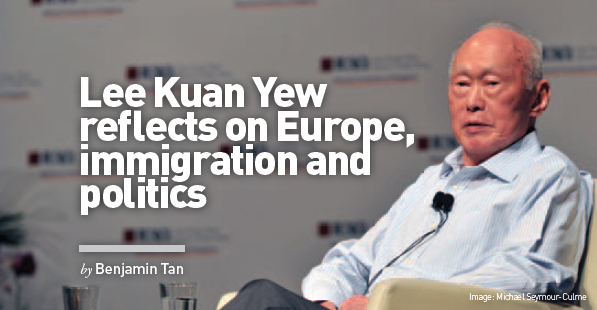Amongst other reasons, I don’t believe Singapore can produce two top-class teams. We haven’t got the talent to produce two top-class teams.

Amongst other reasons, I don't believe Singapore canproduce two top-class teams. We haven't got the talent toproduce two top-class teams.
Even as European leaders work round-the clock to resolve the euro zone debt crisis, Singapore’s Former Prime Minister Lee Kuan Yew sounded the death knell for the beleaguered currency union.
At a dialogue session to mark the seventh anniversary of the Lee Kuan Yew School of Public Policy in September, Mr Lee said the collapse of the currency union will be “a very painful business” and European leaders will fight tooth and nail to prevent that outcome as this would be “an admission that their aspiration of one Europe is not achievable”.
Asked whether Singapore would buy the bonds of debt-ridden European countries, Mr Lee said Singapore’s gross domestic product was a fraction of the European Union’s, and thus it was “in no position to rescue the Europeans, nor do I think that buying their bonds will necessarily rescue them”.
Mr Lee singled out the currency union among the 17 EU countries as the problem: “A fundamental problem of the euro is that it makes everybody, every European country, march to the same drummer whereas each country has its own tempo and you cannot expect the Greeks to march like the Germans, so the problem will not go away.”
“A two-tier Europe or even a three-tier Europe is possible but a one-tier Europe with different spending habits, thrift habits and discipline is too difficult to achieve,” the senior statesman said.
The dialogue, moderated by LKY School Dean, Professor Kishore Mahbubani, was attended by about 600 students, faculty members and guests. When Professor Mahbubani said that a strong EU would be in China’s geopolitical interests, Mr Lee surprisingly disagreed: “No, no, no. It’s easier to deal with 27 weak European countries than to deal with 27 united European countries.”
Mr Lee said good governance alone was not enough to solve problems in troubled times. “All it means is that you have a system in place … In critical times, it might just tip over,” he said, without suggesting what was needed to supplement good governance.
Singapore Concerns
During the 50-minute long dialogue session, the discussion turned towards Singapore and Mr Lee fielded questions ranging from whether the Singapore model would work in a larger nation such as India, to his vision for Singapore’s future.
Addressing the concern about dealing with Singapore’s ageing population after its stop at- two-children policy of the past, Mr Lee welcomed new immigrants as the best solution to the problem. Singapore’s fertility rate has fallen to 1.15, and Mr Lee did not expect to see it going back to 2.1, the rate of replacement, defined as two children per married couple.
Mr Lee noted that ageing populations are seen in developed countries where women are educated and “do not see their future just as bearers of children”.
“So the solution is immigration … and as we age, and there are not enough young people to look after the old, then maybe the population will be receptive to taking in more immigrants,” he said, adding that Singapore could add between 20,000 and 25,000 immigrants annually to expand the population.
When asked by Professor Mahbubani what can be done for Singaporeans to understand better the importance of immigration, Mr Lee replied: “I think we have explained it but they just don’t want to see so many foreigners in their midst.” The turning point for Singaporeans to understand the importance of immigrants, he felt, would be in 20 or 30 years’ time when they realise that immigrants are needed desperately and “are hurt by objecting to immigrants coming to Singapore.” On whether Singapore’s national identity was strong enough to absorb the flow of immigrants, Mr Lee said Singaporeans do not accept the need for immigrants partly because some of them do not speak English. “They’re discomforted when they see the young migrants working at the kopitiam (coffee shop), cleaning the tables, putting our old ladies out of work and unable to speak English,” he said.
It would take a generation for immigrants to “become Singaporean”, as the “accents and speech” of current immigrants have “already been set”, he reckoned.
The Value of an Opposition
Turning to politics, the former Prime Minister, who served from 1959 to 1990, was sceptical whether Singapore would be able to sustain a two-party political system. Though the opposition should remain “competitive” in Singapore’s political landscape, Mr Lee felt two-party systems like those in Europe and America were not good for the country. “Amongst other reasons, I don’t believe Singapore can produce two top-class teams. We haven’t got the talent to produce two top-class teams,” he said. “A generation that grows up in a period of affl uence believes that we have arrived, and as the saying goes, a ‘First World Parliament’ must have a ‘First World Opposition’. So the restlessness, whether that leads to better governance, I am not able to say. We will wait and see – how constructive the opposition can be, or will be,” he said.
At the event, Mr Lee unveiled the French editions of his two-volume memoir, L’Histoire De Singapour (The Singapore Story) and Du Tiers-Monde A La Prosperité (From Third World To First).
Benjamin Tan (benjaminyktan@nus.edu.sg) is Editor of Global-is-Asian